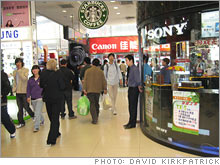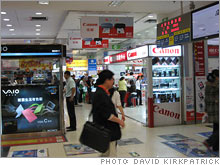Inside China's PC frenzyThe world's fastest-growing - and in many ways, largest - tech market is built around frenzied shopping malls not that different from the souks of old. An on-site report from Fortune's David Kirkpatrick.Beijing (Fortune) -- Walking into the Ding Hao mall in Beijing's Zhongguancun tech neighborhood, the first thing you see is a big booth for Lenovo. That's apt, because the company commands more than 35 percent of the Chinese PC market, more than double number two Founder, which has about 14 percent. Lenovo has paid big bucks (something like $10,000 a month) to get prime position. It's pretty much downhill in terms of decorum, once you push your way past Lenovo's rather elegant trade-show-style booth, where rows of laptops are lined up and crowds of eager purchasers gather round ogling and bargaining with salespeople. This six-story building, with its acres and acres of selling space, is ground-zero in the Chinese technology explosion - the biggest tech mall in China's capital. This is where you come in Beijing if you want to buy anything technological.   China is the world's fastest-growing large PC market, the world's largest cell phone market (an amazing 450 million are in use here now), and home to many of the world's fastest-growing Internet companies. I'm visiting Ding Hao to get a better understanding of how people here feel about technology. And it's impossible to escape the conclusion that they are very very excited. People talk about the importance of the BRIC countries (Brazil, Russia, India and China), but of the four, China is far and away the biggest tech marketplace. Its 23-some million PCs sold each year far outstrips the six million or so sold in India or Russia, or the seven million in Brazil. The government of China is so gung-ho on tech that it is almost literally putting broadband everywhere. According to one well-informed industry expert I spoke with, about 90 percent of China's rural areas already have at least some broadband. That's pretty amazing, even if in many districts only the local Communist party has access to the bandwidths. Ding Hao is the most popular of three similar malls within a two-block area. It's a frenzy of activity even on a Monday, the slowest day of the week. On the weekend you can barely fight your way in. Every city in China, even small ones, has similar tech bazaars. While the lower floors include booths operated by every major PC, camera and printer vendor and large multi-brand retailers, as you wend your way up the escalators you eventually reach warrens of tiny display cases selling graphics cards, mice, cellphone covers, MP3 player cords and any other kind of technology you can imagine. The booths are staffed by fresh-faced young people who shout "Come on in!" (Some even say it in English when they see me.) In this mall Lenovo alone has four stores, and operates about 30 in the neighborhood. Most of the machines on display on the lower floors are laptops, which command about 30 percent of the Chinese market (and are growing at roughly 40 percent, twice as fast as PCs generally). For a mainstream current model you'll pay around $700, not much less than in the United States. But the competition that results from the proximity of all the vendors guarantees a good price, no matter what you are looking for. Generally you can bargain on all but the newest products. But everything isn't cheap. While MP3 players are everywhere, and imitations of an Apple iPod Nano go for about $50 (a two gigabyte model with a larger screen than Apple (Charts, Fortune 500) offers), if you want the genuine article you'll get fleeced. For an 80 gigabyte black iPod like one Amazon sells for $330, one salesman quotes me a price of about $700. As for PCs, Apple's presence here is minimal. When I was last in Beijing's tech neighborhood, in 1998, there were many more grungy job shops assembling no-name PCs on the fly. My guide this week, Microsoft's (Charts, Fortune 500) Deputy General Manager for China Jack Lee, says big makers are gaining here, as being legal and using name-brand products acquires increasing social status. The newer, less-crowded, and more eWorld mall next door will do very well, he says. One reason for my China visit in 1998 was to attend a ceremony celebrating the manufacture of the one millionth Legend PC. Now that seems quaint. The company, renamed Lenovo, subsequently bought IBM's (Charts, Fortune 500) PC business, became the third largest global PC-maker, and now sells around 8 million annually in China alone. It's just a sign of what's to come. While China is already the world's second-largest PC market, with 1.3 billion people it will soon surpass the United States. Ding Hao, eWorld and the thousands of similar malls will get even more packed. |
Sponsors
| |||||||||||
